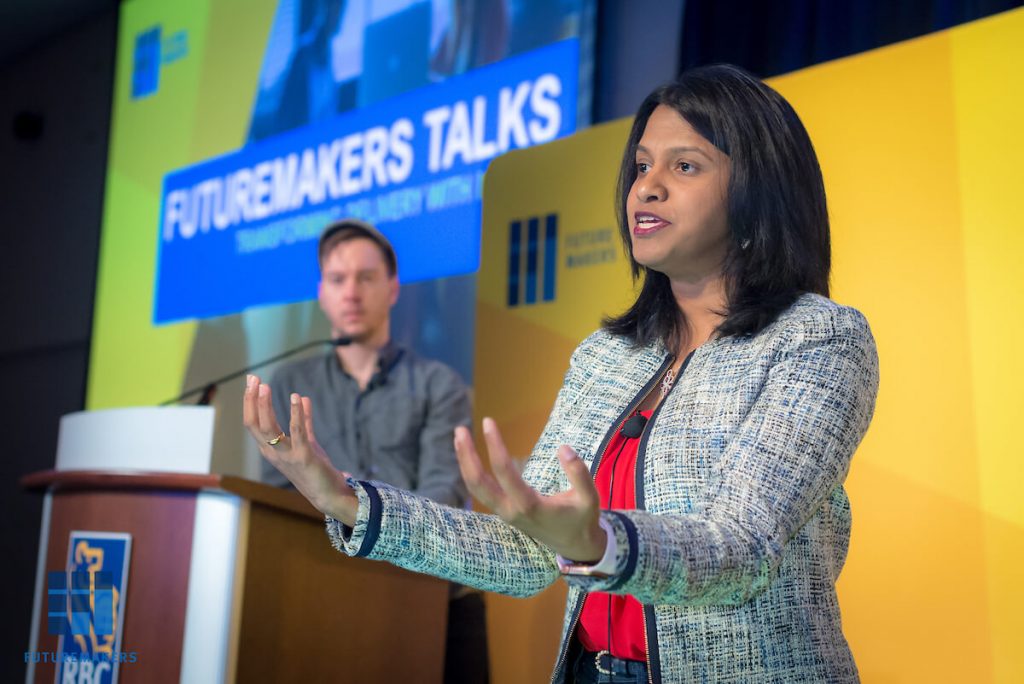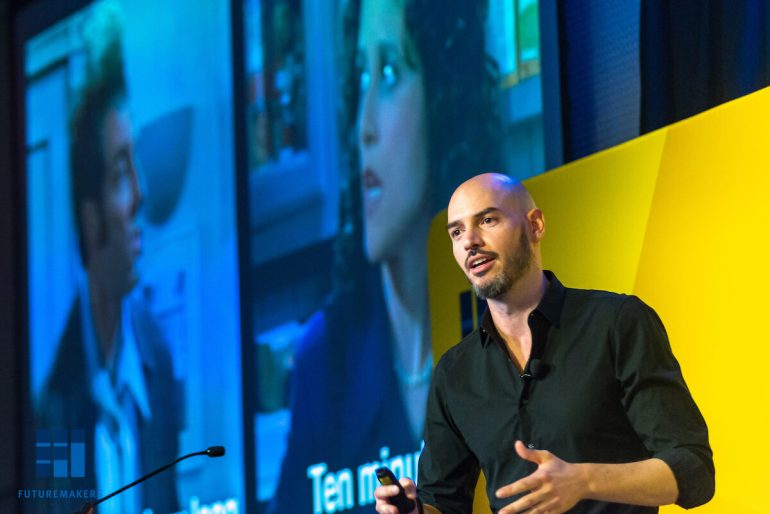As the topic for the May edition of RBC FutureMakers Talks, Transforming Delivery with DevOps was filled with a variety of technical questions – namely, how to make deployment quicker and more successful, and how to build better software faster. But as the night’s three speakers moved through their presentations, it became evident that DevOps is a lot more than just the sum of its technical parts.
The underlying message throughout was that DevOps isn’t just about software builds or deployment schedules, it’s also about the culture and connections between teams, even the ones that don’t think they have a role to play (especially the ones that think they don’t have a role to play).
Steve Pereira, a DevOps and Digital Transformation consultant at vzbl.io, and the founding CTO of Statflo, spoke first and provided a clear example. Presenting his “Top Transformation Tools” for DevOps, Pereira began by explaining the pitfall that comes when people expect their DevOps to run like Netflix or Spotify – “any of the fast-moving unicorns of Silicon Valley,” as Pereira put it.
“There’s a huge difference between the average organization and these high-performing organizations,” he said.
The challenge comes, according to Pereira, when people get distracted and stuck on minor details rather than investing in macro optimization. For example, purchasing new tools rather than investing money and effort to train more than one person for a vital role so deployment timelines don’t get extended if they leave or there’s an emergency. In order to get people to see the bigger picture, Pereira offered his secret weapon for DevOps transformation: Value Stream Mapping.
Kicking-off this month’s #FutureMakers Talks on Transforming Delivery with #DevOps with @SteveElsewhere , sharing the benefits and process of value stream mapping (complete with Seinfeld references 😄) pic.twitter.com/OOu523Yxnc
— Sarah Dinn (@SarahDinn_) May 15, 2019
The exercise first begins with putting people in a room with a whiteboard, then allowing them to map out what their DevOps process looks like. “The more people that share the same picture, the better,” Pereira said.
Walking the FutureMakers audience through the exercise, Pereira noted that the people involved should set a goal, lay out every step of the process, and estimate how much time each step will take, including both average versus worst-case scenario and potential lag time between steps (Pereira made sure to add that Netflix’s scarily fast optimization time is not a reasonable benchmark for most companies).
From there, the mapping can be easily sorted into a spreadsheet dashboard with tasks, timing, and owners, which can be done “over an extended lunch hour” and for free with Excel. Additionally, this can be spun off into an “Ideal” state, which is the benchmark for what the DevOps process should look like at its speediest goal. This makes it easier to spot wins in the process, which can be shared to keep people motivated.
By the end of his talk, Pereira emphasized that teams need to get together and communicate in order to keep people accountable for tasks, illuminate who will need coverage in the event of sickness or vacation, and generally have a better understanding of how everyone is involved the DevOps process. “You don’t know unless you can see the full picture,” he said.
The next speaker was Ian Kerins, Senior Director for the DevOps Development Team at RBC, to discuss the “DevOps Transformation Journey” within the company and how RBC has adjusted to build better products, faster.
Kerins started by asking the audience to “understand the complexity” of how a 150-year-old organization like RBC manages over 20 different tech stacks (compared to companies like Netflix and Google with only one), making standard practices difficult. “We have to prioritize where we focus our efforts,” he said, noting that his team of around 10 people needs to support thousands of developers. Of course, RBC is a financial institution, which means that security needs to be extra tight.
“I don’t want to be the bottle neck for 9,000 RBC tech employees and my weekends are precious to me — showcasing metrics on how DevOps is performing is key to improving it, as well as developers & users experiences.” (Ian Kerins, Sr. Director, DevOps, RBC) #FutureMakers pic.twitter.com/4x4fogd0vX
— Sarah Dinn (@SarahDinn_) May 15, 2019
The solution for RBC was to come up with something “simple, self-serve, automated, and meaningful.” Kerins described how, in 2017, the company automated its DevOps onboarding process by building a faster portal, expanding its tech stacks, and experimenting with a private cloud to help make tools and information more accessible across the company. Kerins’ team has also since been tackling common issues such as too many tools with little time for onboarding and education. The solutions? An opinionated pipeline to give devs control, and smaller training sessions and refresher content to keep teams up to date.
“Do not project plan your DevOps. DevOps is a new way of working. Why would you want to set an end date on that?”
– Lakshmi Baskaran
The RBC DevOps pipeline – Plan, Provision, Developer, Build + Deploy, Test, and Feedback (and many tests, as Kerins noted) – made for a good blueprint for anyone looking to simplify their company’s DevOps process.
The final speaker of the night was Lakshmi Baskaran, the Vice President of Engineering at Leonardo Worldwide Corporation. She was there to share lessons learned through her own experiences and failures in changing the engineering culture towards adopting DevOps processes.
The first lesson learned? Baskaran was quick to note that was no “silver bullet for DevOps implementation in general.”
“Do not project plan your DevOps,” she insisted. “DevOps is a new way of working. Why would you want to set an end date on that? Would you not want it to be sustainable and scalable with your organization as long as possible?”
Her solution: build a road map instead, with built-in established milestones to hit. Not only does this provide a better overview of how the process should run, but it also gives cause to celebrate team members once they reach those milestones.

That recommendation reinforced the message in a common image used to summarize DevOps: a chart showing a connection between Culture, Process, and Tools. However, as Baskaran said, there is no perfect intersection between the three. Instead, she argued that the smarter, more long-term sustainable area to direct your resources towards is Culture. Cultural initiatives suggested by Baskaran included adopting blamelessness (teams respond better to fixing failures if they’re tied to the process and not the person responsible), ownership (DevOps engineers need to own an outcome, so when it gets celebrated, they are inspired to drive more outcomes), and specifically designed goals to be shared between devs and ops.
Culture should be followed by Process, Baskaran argued, followed lastly by Tools, where shed recommended test automation as a great place to start. But driving DevOps transformation will be won or lost with culture: finding and creating DevOps influencers in your existing team, mentoring these influencers to identify useful DevOps initiatives, and incentivizing them to execute those initiatives.
Baskaran summarized that message with one slide: “Culture over Process over Tools – the cultural transformation costs nothing.” As Baskaran herself said to sum up the night, “DevOps is a journey, not a destination.”
Tickets for the next RBC #FutureMakers event on June 12th range from $7-15, but BetaKit readers can get in FREE using the promo code “BetaKitPROMO”.
BetaKit is a FutureMakers media partner.


